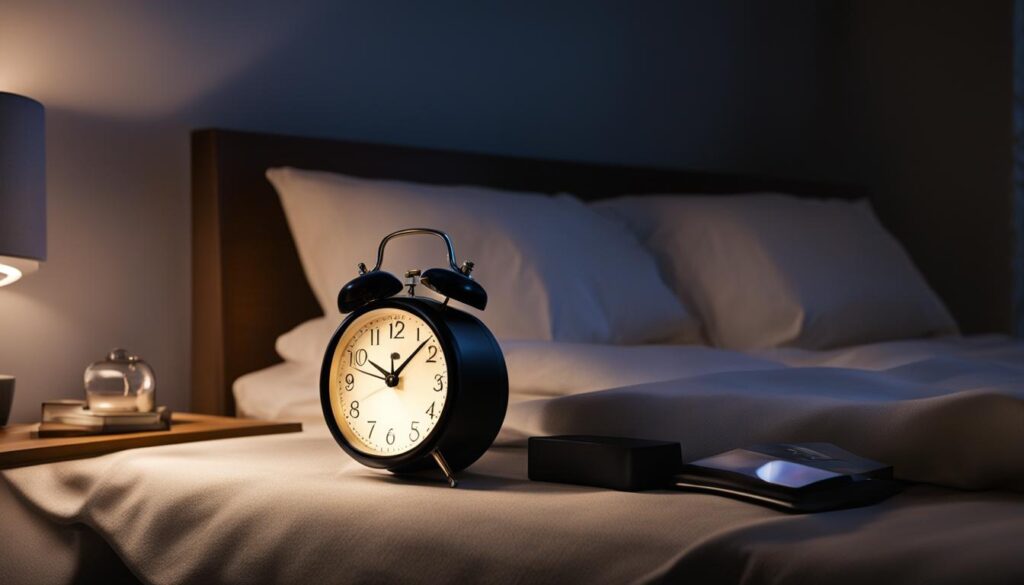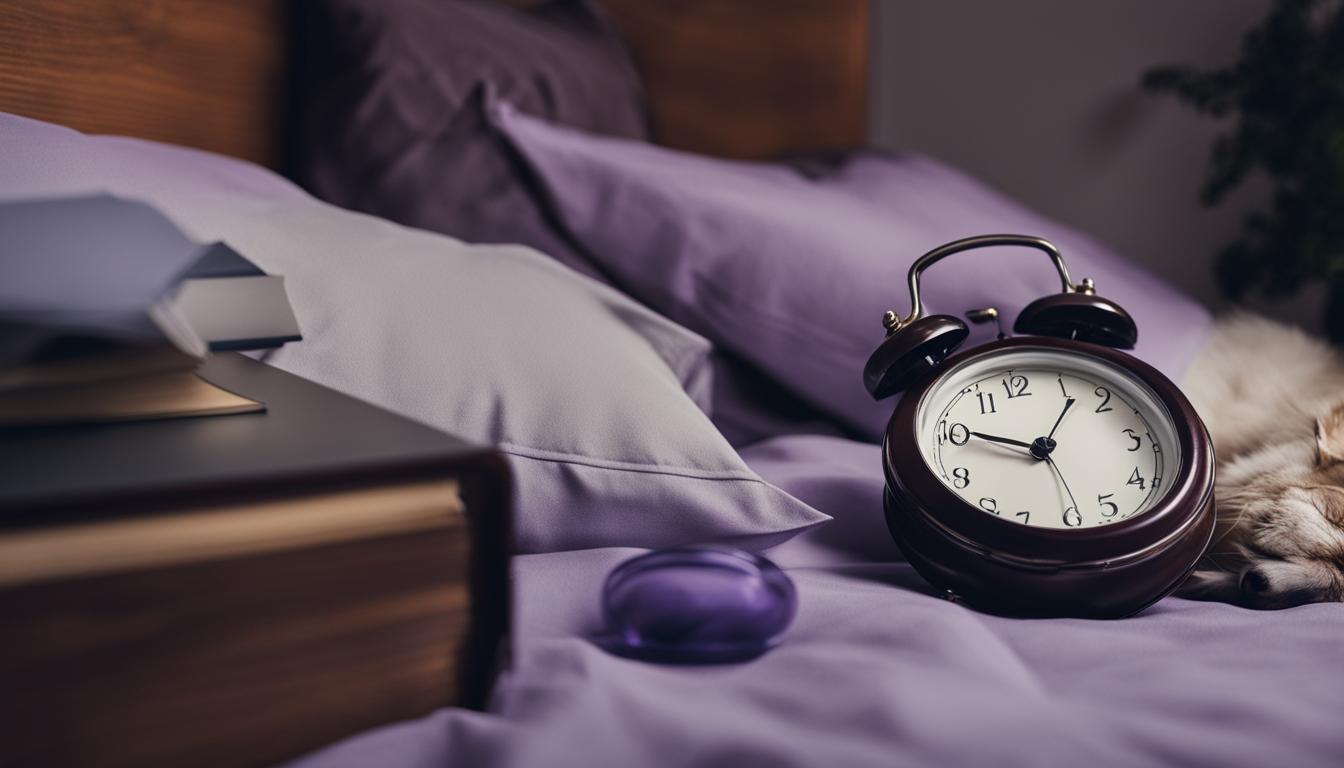Expert Tips and Techniques to Fix Your Sleep Schedule
Are you struggling with maintaining a consistent sleep schedule? Do you find yourself tossing and turning, unable to fall asleep at night? Don't worry, we have the solution for you. In this article, we will share expert tips and techniques to fix your sleep schedule and improve your overall sleep quality.
Having a regular sleep routine is vital for our well-being. Our bodies naturally gravitate towards consistent sleep patterns, which are essential for high-quality sleep. However, factors like stress, work schedules, and lifestyle choices can disrupt our sleep and throw off our circadian rhythms.
But fear not, with the right strategies and habits, you can reset your body clock and establish healthy sleep habits. By adjusting your light exposure, following a regular sleep routine, and incorporating sleep hygiene practices, you can improve your sleep schedule and wake up feeling refreshed every morning.
Key Takeaways:
- Consistency is key when it comes to improving your sleep schedule and sleep quality.
- Light exposure plays a crucial role in regulating your circadian rhythms and melatonin production.
- Establishing a regular sleep routine and following sleep hygiene practices can help improve your sleep patterns.
- Factors like jet lag, shift work, and lifestyle choices can disrupt your sleep routine.
- Adjusting your sleep routine gradually and incorporating healthy sleep habits can reset your body clock.
Understanding Sleep Routines and Circadian Rhythms
Our sleep routines are intricately tied to our body's internal clock, known as the circadian rhythm. This rhythm influences our sleep-wake cycle, regulating when we feel alert and when we feel drowsy. The circadian rhythm is guided by the body's response to light exposure and plays a crucial role in sleep initiation.
The suprachiasmatic nucleus, located in the hypothalamus of our brain, acts as our body's master clock. It receives information about light exposure from the retina and uses this information to regulate sleep patterns. When exposed to bright light in the morning, our body's production of the hormone melatonin decreases, signaling wakefulness and alertness. In the evening, as light diminishes, melatonin production increases, preparing us for sleep.
This delicate balance between light exposure and melatonin production is essential for maintaining a healthy sleep routine. By understanding how our body's internal clock functions and the role that light exposure plays in regulating it, we can make informed choices to improve our sleep schedules and overall sleep quality.
The Sleep-Wake Cycle
The sleep-wake cycle is a manifestation of our circadian rhythm. It determines when we naturally feel sleepy and when we are most alert. In a typical sleep-wake cycle, we experience peaks of alertness during the day, followed by a gradual increase in sleepiness in the evening, leading to a restful night's sleep.
However, disruptions to our sleep routine, such as irregular sleep schedules or exposure to artificial light at night, can throw off our sleep-wake cycle. This can lead to difficulty falling asleep, frequent awakenings during the night, or feeling groggy and tired during the day. By understanding the intricate relationship between our sleep routine and our circadian rhythm, we can make adjustments to promote optimal sleep patterns and improve our overall sleep quality.
| Sleep Routine | Circadian Rhythm |
|---|---|
| Consistent bed and wake-up times | Regulates sleep-wake cycle |
| Avoidance of stimulating activities before bed | Prepares the body for sleep |
| Exposure to natural light in the morning | Signals wakefulness and alertness |
| Avoidance of bright lights in the evening | Increases melatonin production for sleep |
By aligning our sleep routine with our body's circadian rhythm, we can establish a healthy sleep-wake cycle and ensure optimal rest. This includes maintaining consistent bed and wake-up times, avoiding stimulating activities before bed, and optimizing our exposure to natural light in the morning while minimizing bright light exposure in the evening. By prioritizing our sleep routine and working with our body's natural rhythms, we can improve our overall sleep quality and wake up feeling refreshed and rejuvenated each day.
Factors that Disrupt Sleep Routines
Several factors can disrupt our sleep routines and throw off our circadian rhythms. Here are some common culprits:
- Jet lag: Rapid travel across multiple time zones can desynchronize our internal clocks, making it difficult to adjust to new sleep-wake times.
- Shift work: Working irregular hours or night shifts can disrupt our natural sleep-wake cycles, as we may need to be awake during the night and sleep during the day.
- Fluctuating sleep hours: Inconsistent sleep timing, such as going to bed at different times each night, can confuse our body's internal clock and lead to sleep disruptions.
- Artificial light exposure: Excessive exposure to artificial light, especially in the evening, can interfere with melatonin production and hinder the body's ability to prepare for sleep.
- Behavior patterns: Certain habits or behaviors, such as engaging in stimulating activities close to bedtime or using electronic devices in bed, can make it harder to fall asleep and maintain a regular sleep routine.
- Caffeine: Consuming caffeine, particularly close to bedtime, can interfere with sleep initiation and disrupt the natural sleep-wake cycle.
- Stress: High levels of stress can keep the mind alert and make it difficult to wind down and relax before bed, leading to disrupted sleep patterns.
Understanding these factors can help identify potential disruptors in your own sleep routine and take necessary measures to minimize their impact.
The Impact of Jet Lag and Shift Work
Jet lag and shift work are two specific factors that can significantly disrupt sleep routines.
Jet lag: When you travel across multiple time zones, your body's internal clock struggles to adjust to the new time zone. This can cause symptoms like fatigue, insomnia, and difficulty concentrating. To minimize the impact of jet lag, gradually shift your sleep-wake times a few days before traveling and expose yourself to natural light at appropriate times in the new time zone.
Shift work: People who work night shifts or rotating shifts often experience sleep disruptions due to the misalignment between their work schedule and their natural sleep-wake cycle. Establishing a consistent sleep routine, creating a sleep-friendly environment, and using relaxation techniques can help alleviate the negative effects of shift work on sleep.
By understanding these factors and their impact on sleep, you can take steps to minimize their influence and improve your sleep routine.
How to Adjust Your Sleep Routine
To achieve a healthy sleep schedule, it is essential to make gradual adjustments and establish a consistent routine. Here are some expert tips and techniques to help you adjust your sleep routine:
- Define Your Sleep-Wake Times: Determine the ideal times for both sleep and wake-up based on your individual sleep needs, chronotype, and lifestyle. Aim for a consistent schedule that allows for sufficient rest.
- Gradually Shift Your Sleep Times: Start shifting your sleep times gradually by 15 to 30 minutes every few days. This gradual adjustment allows your body to adapt to the new schedule more easily.
- Manage Light Exposure: Incorporate light exposure in the morning and during the day to help synchronize your circadian rhythm. Spend time outdoors and expose yourself to natural daylight. In the evening, avoid bright lights and limit exposure to artificial light sources, such as electronic devices, as they can disrupt melatonin production.
- Limit Caffeine Intake: Be mindful of your caffeine consumption, particularly in the afternoon and evening. Caffeine is a stimulant that can interfere with sleep quality and make it more difficult to fall asleep.
- Exercise in the Morning or Daytime: Engaging in regular physical activity can promote better sleep. Try to schedule your exercise routine in the morning or daytime, as exercising close to bedtime may increase alertness and make it harder to fall asleep.
- Consider Meal Times: Be conscious of your meal times, especially in the evening. Avoid consuming large meals or heavy snacks close to bedtime, as this can disrupt your sleep and cause discomfort.
By implementing these adjustments and maintaining a consistent sleep routine, you can gradually improve your sleep schedule, enhance sleep quality, and support overall well-being.
Importance of a Sleep Schedule
Maintaining a regular sleep schedule is crucial for ensuring high-quality sleep and synchronizing our circadian rhythms. When we establish a consistent sleep schedule, our bodies become attuned to a pattern of sleep and wakefulness, leading to more restful nights and improved overall sleep quality. By aligning our sleep schedule with our natural circadian rhythm, we optimize our rest and support the optimal functioning of our body and mind.
A consistent sleep schedule helps regulate our sleep-wake cycle, which is controlled by our internal clock, the circadian rhythm. Our bodies are naturally inclined to follow this rhythm, and when we maintain a consistent sleep schedule, we reinforce this natural pattern. By going to bed and waking up at the same time every day, we create a habit that allows our body to anticipate sleep and wakefulness, promoting a more seamless transition between the two.
In addition to promoting better sleep quality, a regular sleep schedule also benefits our overall health and well-being. Studies have shown that consistent sleep patterns are associated with improved cognitive function, better mood, and enhanced productivity throughout the day. By prioritizing our sleep schedule and ensuring we get the recommended amount of sleep each night, we set ourselves up for success in various aspects of our lives.

Creating a consistent sleep schedule may require some adjustments and discipline, especially if we have been accustomed to irregular sleep patterns. However, the benefits of maintaining a regular sleep schedule are well worth the effort. By prioritizing our sleep and aligning our habits with our body's natural rhythms, we can enjoy optimal rest, improved sleep quality, and a healthier, more productive life.
Advice from a Sleep Doctor
In our quest to fix our sleep schedule and improve our sleep quality, we turned to sleep specialist Dr. Chester Wu for expert advice. Dr. Wu emphasizes the importance of light exposure in regulating our body clocks and optimizing our sleep cycles. According to him, sunlight plays a crucial role in resetting our circadian rhythm and improving our sleep-wake patterns.
“Getting sunlight as soon as you wake up is essential for synchronizing your body clock,” says Dr. Wu. “Exposing yourself to natural daylight helps signal to your brain that it's time to wake up, promoting alertness and vitality.”
Dr. Wu also advises spending time in natural daylight throughout the day to maintain a well-synchronized circadian rhythm. This means going outside and enjoying the benefits of sunlight whenever possible. However, he highlights the importance of avoiding light exposure, especially from electronic devices, close to bedtime.
To reset your sleep schedule and optimize your sleep cycle, Dr. Wu stresses the significance of managing your light exposure. By aligning your exposure to sunlight with your desired sleep-wake times, you can regulate your body clock and improve your overall sleep quality.
| Key Advice from Dr. Chester Wu |
|---|
| Expose yourself to sunlight as soon as you wake up |
| Spend time in natural daylight throughout the day |
| Avoid light exposure, especially from electronic devices, close to bedtime |
| Manage your light exposure to align with your desired sleep-wake times |
Following Dr. Wu's expert advice can help you fix your sleep schedule, reset your body clock, and improve your sleep quality. By incorporating light exposure in the right way, you can optimize your sleep cycle and ensure a restful night's sleep.
How to Reset Your Sleep Schedule
To reset your sleep schedule and establish a healthy sleep routine, it's important to make gradual adjustments to your sleep-wake times and manage your exposure to light. By understanding the role of circadian rhythms and light exposure, you can optimize your sleep-wake cycle and improve your overall sleep quality.
Start by determining your ideal sleep and wake-up times based on your individual sleep needs and preferences. This will serve as a guideline for adjusting your sleep schedule. Gradually shift your sleep times by 15 to 30 minutes every few days, allowing your body to adapt to the new routine.
Light exposure plays a crucial role in resetting your circadian rhythm. Expose yourself to natural light in the morning and throughout the day to signal wakefulness to your body. Avoid bright lights and electronic screens in the evening, as they can hinder the production of melatonin, a hormone that promotes sleep readiness.

The Role of Light Exposure
Light exposure plays a critical role in regulating our circadian rhythm and sleep-wake cycles. The timing and intensity of light can significantly impact our internal clock, influencing our sleep patterns and overall sleep quality. Understanding the different effects of morning light, daylight, and evening light can help us optimize our exposure and enhance our sleep-wake cycle.
The Impact of Morning Light
In the morning, exposure to natural sunlight can be particularly beneficial for regulating our circadian rhythm. The blue light in sunlight suppresses melatonin production, signaling our body to wake up and start the day. By getting sunlight as soon as we wake up, whether through outdoor activities or opening curtains, we can help synchronize our internal clocks with the external environment and promote wakefulness and alertness.
The Importance of Daylight
Daytime light exposure, especially natural daylight, helps maintain a well-synchronized circadian rhythm. Spending time outdoors during the day can enhance our sleep-wake cycle by reinforcing the signal of daytime wakefulness. If spending time outside is not possible, ensuring adequate indoor light exposure, such as through bright lights or light therapy devices, can also have similar effects on regulating our internal clock.
The Disruptive Effects of Evening Light
In the evening, exposure to artificial light, especially from electronic devices and bright indoor lighting, can interfere with our sleep readiness. The blue light emitted by these sources suppresses melatonin production and disrupts the natural transition from wakefulness to sleep. To promote optimal sleep, it is essential to avoid bright screens and reduce exposure to artificial light in the evening hours before bedtime. Dimming lights, using lamps with warm-colored bulbs, and limiting electronic device use can help signal to our body that it is time to wind down and prepare for sleep.
| Light Exposure | Effects |
|---|---|
| Morning Light | Suppresses melatonin production, promotes wakefulness and alertness |
| Daylight | Maintains a well-synchronized circadian rhythm, reinforces daytime wakefulness |
| Evening Light | Interferes with sleep readiness, suppresses melatonin production |
Conclusion
Fixing your sleep schedule and establishing a healthy sleep routine is crucial for optimizing your sleep quality. By understanding the role of circadian rhythms, light exposure, and sleep patterns, we can make gradual adjustments to align our sleep schedule with our natural sleep-wake cycle.
Consistency is key when it comes to improving our sleep schedule. By following a regular sleep routine and sticking to consistent sleep and wake-up times, we can train our bodies to establish a pattern of restful nights and wakefulness during the day. This helps synchronize our circadian rhythm and promote optimal sleep quality.
Managing light exposure is another essential aspect of fixing our sleep schedule. By incorporating morning light exposure and avoiding evening light, especially from artificial sources, we can regulate our internal clocks and support healthy sleep initiation. Maintaining a balance of natural daylight and avoiding excessive exposure to artificial light can have a significant impact on our sleep-wake cycle and overall sleep quality.
Remember, improving your sleep schedule is a gradual process that requires commitment and healthy sleep habits. By implementing these expert tips and techniques, you can take control of your sleep routine, align it with your circadian rhythm, and enjoy the benefits of a well-rested and revitalized body and mind.
FAQ
How can I fix my sleep schedule?
To fix your sleep schedule, you can adjust your sleep-wake times gradually, incorporate light exposure in the morning, and avoid light exposure in the evenings. It's important to maintain consistency in your sleep routine and follow healthy sleep habits.
What are circadian rhythms?
Circadian rhythms are the patterns of physical, mental, and behavioral changes that follow a roughly 24-hour cycle. They regulate our sleep-wake cycles and are influenced by factors such as light exposure and melatonin production.
What factors can disrupt my sleep routine?
Several factors can disrupt your sleep routine, including jet lag, shift work, delayed or advanced sleep timing, artificial light exposure, fluctuating sleep hours, behavior patterns, caffeine intake, and stress.
How can I adjust my sleep routine?
To adjust your sleep routine, start by determining your ideal sleep and wake-up times. Gradually shift your sleep times by 15 to 30 minutes every few days. Incorporate morning light exposure and manage your caffeine intake, exercise, and meal times.
Why is a sleep schedule important?
Maintaining a regular sleep schedule is important for ensuring high-quality sleep and synchronizing your circadian rhythms. A consistent sleep schedule helps establish a pattern of sleep and wakefulness, leading to more restful nights and improved overall sleep quality.
What advice can a sleep doctor provide for fixing my sleep schedule?
According to sleep specialist Dr. Chester Wu, fixing your sleep schedule revolves around light exposure. Getting sunlight as soon as you wake up, spending time in natural daylight, and ensuring dark evenings and nights help regulate your body clock and improve your sleep cycle.
How can I reset my sleep schedule?
To reset your sleep schedule, gradually adjust the timing of your circadian clock by determining your ideal sleep and wake-up times. Incorporate light exposure in the morning and avoid light exposure in the evenings to reset your circadian rhythm and promote a healthy sleep routine.
What is the role of light exposure in sleep?
Light exposure plays a critical role in regulating our circadian rhythm and sleep-wake cycles. Morning light exposure helps synchronize our internal clocks with the external environment, promoting wakefulness and alertness. Daytime light exposure helps maintain a well-synchronized circadian rhythm, while evening light exposure, particularly from artificial sources, can disrupt our melatonin production and hinder sleep readiness.
How can fixing my sleep schedule improve sleep quality?
By aligning your sleep schedule with your natural circadian rhythm, you optimize your rest and support optimal functioning of your body and mind. Consistency, light exposure management, and healthy sleep habits contribute to improved sleep quality.
Source Links
- https://www.everydayhealth.com/sleep/insomnia/resetting-your-clock.aspx
- https://www.risescience.com/blog/how-to-reset-sleep-schedule
- https://www.sleepfoundation.org/sleep-hygiene/how-to-reset-your-sleep-routine











Leave a Reply